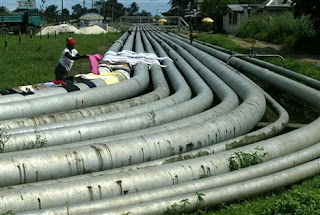Shell looks to LNG boost from Russia
Russia has invited Royal Dutch Shell to take part in the Sakhalin-3 and Sakhalin-4 oil and gas projects in Russia's Far East.
Prime Minister Vladimir Putin made the offer at a meeting with the company on Saturday. Putin said the projects will require Shell's experience in deep offshore extraction.
The company has been active in exploring Russia's Far East since the Sakhalin-2 project in the 1990's. Together with Gazprom, Shell is building Russia's first Liquefied Natural Gas plant, with Putin saying he supported Shell's plans to increase production.
“We know about your plans to expand the LNG plant to increase the output. This will ensure supplies for the domestic market and the Asia – Pacific region.”
Shell has also signed a deal with Russian shipbuilder Sovcomflot, which will provide it with LNG tankers. Several days before the meeting, Shell's vice-president Chris Finlayson spoke on perspectives of LNG use exclusively to RT.
“LNG is certainly the way forward. It’s the dominant form of delivering gas in the Pacific basin, which Sakhalin is uniquely positioned to serve – its only 2 and a half days sailing time to Tokyo. Gas flows from as far away as the Middle East to Japan, so you can see the advantage that exists there. Pricing is based on oil, in that Pacific basin market, and also it’s very well positioned for delivering into the United States, and to Southern California and into Mexico where there are also contracts that both ourselves and Gazprom global LNG trading have. It’s a profitable way, an effective way of delivering a premium fuel. That’s why of course, in Europe, many countries are building LNG terminals as well. There will be clearly competition between pipeline gas, LNG gas, and LNG gas has to be competitive to grow in those markets too. So I think it is very much a fuel where we see significant growth, not just for a few years but for the next few decades, both because of the lower carbon content but also because of the efficacy and the ability to deliver that fuel to any destination worldwide.”
RT: How do Shell’s activities in Russia differ from those in other emerging markets, particularly the other BRIC countries?
CF: “We have operations in all of the other BRIC countries indeed. I don’t think that I would say that our approach varies greatly between the countries. In all of the countries we work together with the state companies in the upstream sector. And in all the countries we see downstream entries, and Russia has been somewhere where we have put a lot of effort into – we are the largest foreign lubricant seller in Russia, we are the only foreign company that does refueling of aircraft in Russia.”

